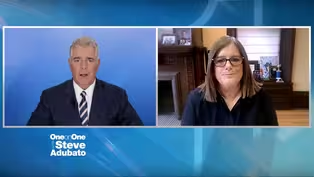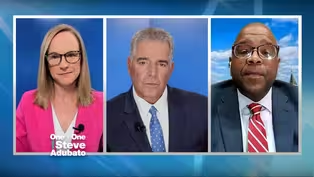One-on-One
The Importance of Creating Diverse Programming at NJPAC
Clip: Season 2024 Episode 2741 | 8m 57sVideo has Closed Captions
The Importance of Creating Diverse Programming at NJPAC
Donna Walker-Kuhne, Senior Advisor of Diversity, Equity, and Inclusion at the New Jersey Performing Arts Center, joins Steve Adubato to discuss the important role of creating programming representing Newark's diversity and facilitating tough conversations within minority communities.
Problems playing video? | Closed Captioning Feedback
Problems playing video? | Closed Captioning Feedback
One-on-One is a local public television program presented by NJ PBS
One-on-One
The Importance of Creating Diverse Programming at NJPAC
Clip: Season 2024 Episode 2741 | 8m 57sVideo has Closed Captions
Donna Walker-Kuhne, Senior Advisor of Diversity, Equity, and Inclusion at the New Jersey Performing Arts Center, joins Steve Adubato to discuss the important role of creating programming representing Newark's diversity and facilitating tough conversations within minority communities.
Problems playing video? | Closed Captioning Feedback
How to Watch One-on-One
One-on-One is available to stream on pbs.org and the free PBS App, available on iPhone, Apple TV, Android TV, Android smartphones, Amazon Fire TV, Amazon Fire Tablet, Roku, Samsung Smart TV, and Vizio.
Providing Support for PBS.org
Learn Moreabout PBS online sponsorship(upbeat music) - Hi, everyone, Steve Adubato.
We kick off the program with an important conversation with Donna Walker Kuhne, who is senior advisor for diversity, equity, and inclusion at the great New Jersey Performing Arts Center, otherwise known as NJPAC.
Donna, great to have you with us.
- Thank you so much.
- Well, listen, we've talked to John Schreiber and others at NJPAC, and many of your folks and colleagues on the art side.
You're on a different side of the house dealing with different issues.
Describe the work of diversity, equity, and inclusion at NJPAC, please.
- Yes, so I am the senior advisor of diversity, equity, and inclusion, and we created this role approximately four years ago when we started looking at our strategic plan and realized that we wanted to make sure that DEI was a pillar of NJPAC and how we do business on every level, every aspect.
So it's more of a thread as to how we're making sure that we are recognizing the diversity, particularly of Newark, New Jersey, that we are being as equitable as possible in how we deal with our staff, and our artists, our students, that we are including as many people as possible in the conversations, and, of course, looking at accessibility from a neural disability perspective, as well as the physical components.
- Donna, let me ask you this, there's a new initiative called Standing in Solidarity.
- Yes.
- What is it, and why is it so impactful?
- So after the murder of George Floyd, NJPAC really started thinking very quickly about how can we be responsive as the state's cultural anchor institution?
How can we really demonstrate what it means to be anti-discriminatory arts organization?
And we already had a series called the PSEG True Diversity Film Series.
We had been running those films and panel discussions five years prior to 2020.
So we decided to use that format, but focus on social justice topics that primarily impact Black and Brown, LGBTQ, and women.
And so we launched immediately that July with our first series, and if you recall, we were in the pandemic, so all of this was on Zoom.
So each month we present a social justice topic with action steps and solutions.
And so we choose a film that reflects the theme, and then we bring together panelists who have expertise in these particular areas.
- Donna, we're gonna put up the website for the New Jersey Performing Arts Center so people can find out more.
I'm curious about this, and I've talked to John Schreiber about this, the CEO there, many times, on the air and off the air.
So I often wonder, and this is in connection with this initiative, the Black Jewish Dinner Dialogue.
First of all, what is that?
And then, I'll ask my question.
What is the Black Jewish Dinner Dialogue?
- That is a monthly series of dialogues between Jewish leadership, primarily rabbis, and heads of civic organizations, as well as Black faith-based, and civic leaders, and educators.
We come together every month and we talk about how do we get to know each other more deeply?
What are the issues that each of us faces?
And how can we unite?
How can we look at solidarity, and what would that mean in 2024?
- I actually had this conversation with Dr. Cornel West recently, and I asked him in the interview, why is it so hard for so many of us to have honest conversations about race, racial differences, race relations?
We had an interesting conversation about it.
But let's shift this a little bit.
As hard as it is, what role do you believe NJPAC potentially plays in creating possible dialogue between those in the Jewish community, those who are strong advocates of Israel, particularly given the horrific events of October 7th, and those who are sensitive to the experience of those in Gaza, Palestinians, who are clearly suffering?
Here's the question, is there a possibility to actually have a real dialogue that's respectful and meaningful, acknowledging some differences and similarities, but at least talk to each other, not past each other?
Is there a question there at all, Donna?
- Oh, I can answer that on two levels.
- Sure.
- Personally, I do believe there's an opportunity for dialogue.
It's difficult, but I do believe that personally.
As an institution, we have chosen not to make a public statement on either side of the Middle East conflict, but what we do believe is in peace.
And we do believe that we want to support any effort that is advocating people looking at the humanity that we all have and the dignity of life that we all share.
So that's our position regarding- - But we can talk, you're saying it's not about taking, I'm not talking about taking a position, because we're trying to do meaningful programming in this area and it's challenging.
Is it realistic at NJPAC and other organizations, like ours and others, can have leaders in the Jewish community and leaders in the Palestinian/Muslim community together to have a conversation?
Or is it, "Let's stay away from that"?
- That's an interesting question.
I think that's something we would be discussing more internally, but immediately I would say, yes, I believe that we can.
I think it will be challenging and difficult.
But with these monthly dialogues that we've been having, it's laid the foundation of how to really support and respect, regardless of perhaps political beliefs, and that we believe is important as an anchor institution.
- You know, the whole concept of being anti-racist or an anti-racist initiative, NJPAC's involved, other folks that we are connected to have anti-racism, anti-racist initiative.
Donna, is it about potentially trying to change people's hearts?
Or help them try to understand our own prejudice and racism and confront why it's so dangerous?
I know it's a loaded question.
- Yes.
- Go ahead, please.
- No, it's a perfect question, because that's a lot of my responsibility here.
So we have online diversity training four times per year, and we've been doing this now for three years.
After each of these mandatory staff trainings, we have small group discussions that I lead, and in these discussions we unpack what does it mean to have bias?
What does it mean to have microaggressions?
What does it feel like and how can we be conscious of that?
So we're very active on that lane.
And then, we have a book club where we read books that also inform us about shared identities regardless of what we look like culturally or racially.
And that has been a wonderful opportunity for us to deepen our knowledge of each other.
Our focus here is really building a culture of inclusion.
In order to do that, we have to unpack what are the barriers.
And, fortunately, because John Schreiber is leading the way, and that's imperative that the CEO has solid footprints in this area, you know, we're able to create this culture, I think, in a very robust and authentic way.
- Well said, Donna.
- Thank you.
- We need more of the work you're doing every day.
Can't thank you enough for joining us, we appreciate it.
- Thank you so much.
- You got it.
Stay with us, we'll be right back.
- [Narrator] One-On-One with Steve Adubato is a production of the Caucus Educational Corporation.
Celebrating 30 years in public broadcasting.
Funding has been provided by PSEG Foundation.
Newark Board of Education.
Robert Wood Johnson Foundation.
Horizon Blue Cross Blue Shield of New Jersey.
RWJBarnabas Health.
Let’s be healthy together.
The Port Authority of New York and New Jersey.
The Turrell Fund, a foundation serving children.
Wells Fargo.
And by The Fidelco Group.
Promotional support provided by NJ.Com.
And by BestofNJ.com.
(bright music) - Life is unpredictable.
Health insurance shouldn't be.
For over 90 years, Horizon Blue Cross Blue Shield of New Jersey has provided quality, affordable health plans to New Jersey residents.
We have served generations of New Jersey families and businesses and are committed to driving innovations that put you at the heart of everything we do.
Our members are our neighbors, our friends, and our families.
We're here when you need us most.
Horizon, proud to be New Jersey.
Michele Adubato and the Philosophy of Leadership
Video has Closed Captions
Clip: S2024 Ep2741 | 8m 44s | Michele Adubato and the Philosophy of Leadership (8m 44s)
Stanton Brown Talks Leadership & Innovation for Young Adults
Video has Closed Captions
Clip: S2024 Ep2741 | 10m 55s | Stanton Brown Talks Leadership & Innovation for Young Adults (10m 55s)
Providing Support for PBS.org
Learn Moreabout PBS online sponsorship
- News and Public Affairs

Top journalists deliver compelling original analysis of the hour's headlines.

- News and Public Affairs

FRONTLINE is investigative journalism that questions, explains and changes our world.












Support for PBS provided by:
One-on-One is a local public television program presented by NJ PBS

